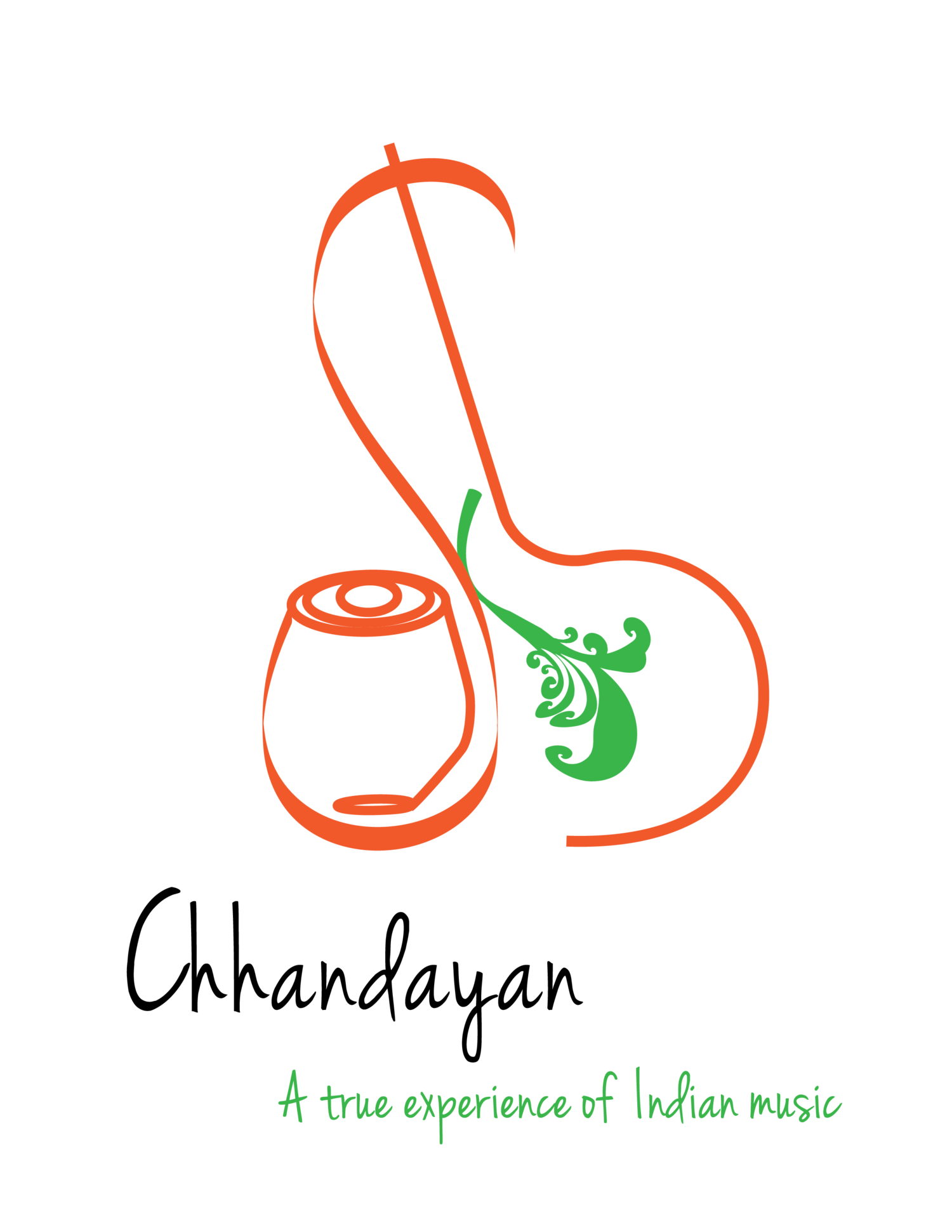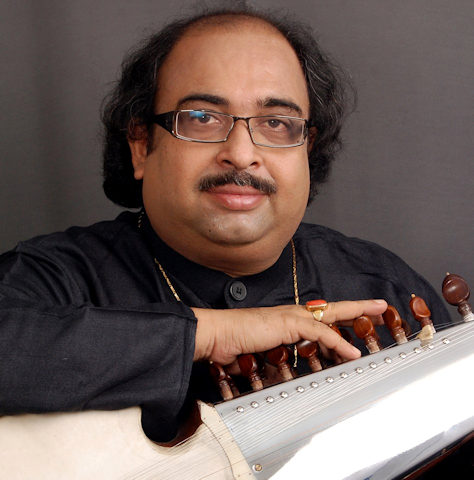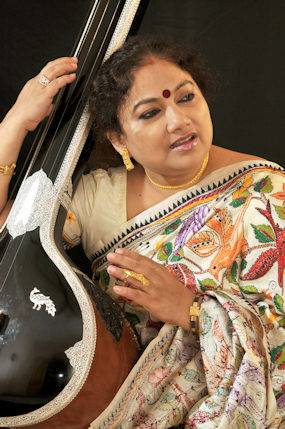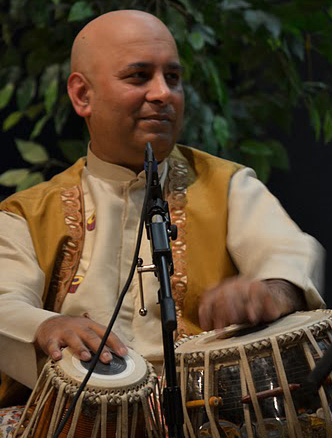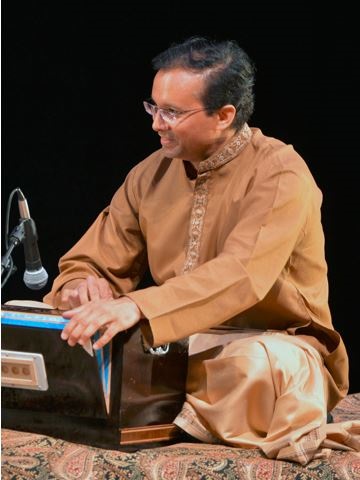Sarode - Tejendra Narayan Majumdar
Vocal - Manasi Majumdar
Tabla - Samir Chatterjee
Harmonium - Neelesh Nadkarni
Schedule
Welcome address
First Half:
Vidushi Manasi Majumdar - Vocal
Samir Chatterjee - Tabla
Neelesh Nadkarni - Harmonium
Intermission - 15 mts
Second Half:
Tejendra Narayan Majumdar - Sarode
Samir Chatterjee - Tabla
Tejendra Narayan Majumdar
One of the best-known and undoubtedly one of the busiest Sarode maestros of the world, Pandit Tejendra Narayan Majumdar, has long achieved that order of excellence and universal acclaim, which ensures him to be one of the foremost icons of Indian Classical Music throughout the globe.
Training:
Early initiation into music by his grandfather, Late Bibhuti Ranjan Majumdar and later his father, Late Ranjan Majumdar, nurtured Tejendra's considerable talent. Tejendra was accepted by the Sarod Maestro Late Ustad Bahadur Khan as his disciple. Vocal and rhythm training under Late Pandit Amaresh Chowdhury and Sri Anil Palit further ensured a holistic musical development in him. Eighteen years of intensive study under Late Ustad Bahadur Khan matured his talent into a true genius.
After the untimely demise of his guru, he studied under Late Sri Ajay Sinha Roy. He was then accepted as a disciple by none other than Late Swara Samrat Ustad Ali Akbar Khan. He continued to learn from the Legend until his demise.
Recognition:
Recognition came as early as in 1981, when he stood first in the All India Radio Music Competition and was awarded the President's Gold Medal and the Pandit D.V. Paluskar Award. Thenceforth, he did not have to look backwards and has performed and gained recognition in 4 continents. Quite obviously, he is also a Top Grade artist of A.I.R and Doordarshan. This year, the Government of West Bengal has awarded him Banga Bhushan as well as Sangeet Mahasamman, the highest award for music in West Bengal.
Style:
One of the best equipped musicians to carry on the great Senia Maihar mantle, Tejendra combines the intellectual density and technical virtuosity of his gharana, with an extraordinary tone, touch and an ambient melody which transcends any qualification. Tejendra's repertoire combines elements from the Dhrupad, Tantrakari as well as Gayaki styles of music. Above all, he has, in abundant measure, that indescribable ability to take the listeners along with him - the rare quality that is the hallmark of a genius.
Social Contributions:
1. Pandit Tejendra Narayan Majumdar was invited to perform for the 50thIndependence Day Celebration of India in New York, USA, at World Trade Centre (the historic Twin Towers) on 15thAugust, 1997
2. After the Kargil War in 1999, he had organized a Relief-Fund-Raising concert in which various maestros of Indian Classical Music had taken part, and had donated the full amount of INR 1 Lakh raised due to the concert towards their relief
3. Just after the Nepal earthquake, a few months back, he had participated in Nepal Earthquake Relief-Fund-Raising concert in Nashville, USA
Classical Concerts:
Most of his time is, however, taken up in touring the country and abroad, presenting innumerable concerts, workshops, lecture demonstrations, doing recordings and taking up teaching assignments.
In 2009, he was invited by none other than Bharat Ratna Late Pandit Ravi Shankar to perform at the Hollywood Bowl, Hollywood, Los Angeles, USA.
Accompanying Artistes:
Pandit Tejendra Narayan Majumdar has been accompanied by a wide range of Tabla maestros right from Pandit Kishen Maharaj, Ustad Zakir Hussain, Pandit Shankar Ghosh, Pandit Swapan Chaudhuri, Pandit Kumar Bose, Pandit Anindo Chatterje, Pandit Sanjay Mukherjee, Ustad Sabir Khan to Pandit Subhankar Banerjee, Pandit Yogesh Samsi, Pandit Bickram Ghosh and Pandit Tanmoy Bose.
Classical Collaborations:
His trio and duet renditions with Vocal maestros Ustad Rashid Khan and Pandit Ajoy Chakraborty, his duet renditions with Sitar maestros such as Ustad Shahid Pervez, Ustad Shujaat Hussain Khan, Pandit Kushal Das have been widely acclaimed and are highly appreciated throughout the globe. He has not stopped himself from collaborating with Carnatic maestros like Dr. M. Balamuralikrishna, Ganesh Rajagopalan, Mysore Manjunath, N. Ravikiran and Shashank Subramanyam.
World Music Concerts:
Pandit Tejendra Narayan Majumdar is also well known for his World Music endeavours. He has collaborated to present World Music with names such as Sivamani, Trilok Gurtu, Louis Banks, George Brooks and Ganesh Rajagopalan.
Compositions:
Pandit Tejendra Narayan Majumdar's brilliance and popularity as a classical artiste has not dimmed his interest in composing, arranging and experimenting in other areas of music. From composing the background score of meaningful films to musical ballets - Tejendra is always ready to take on any musical challenge. He has composed the music for Bengali films like ‘Sajarur Kaata’, ‘Shongshoy’ and ‘Hononkal’ of Saibal Mitra, ‘Tollylights’ of Arjun Chakraborty, and a number of Telefilms. He has also composed and arranged music for different singers like Ghulam Ali, Pandit Ajoy Chakraborty, Ustad Rashid Khan, Haimanti Shukla, Arati Mukherjee, etc.
One of his composed and arranged music albums “SOUL CALL- OM NAMOH NARAYANAY” had been nominated for the 2010 GRAMMY AWARDS!
Manasai Majumdar
Manasi Majumdar came from a family with a musical heritage. She started her initial training from her father late Manoranjan Ray Chowdhury who was disciple of Suren Banerjee, who was the maestro musician of Vishnupur Gharana. Later she took lessons from Bijonbala Ghosh Dastidar, Nihar Ranjan Banerjee, Uma De and Late Amaresh Chowdhury. In her teens, she appeared in many prestigious concerts in India , and stood first in Khayal in All India Radio Music Competetion in 1981. Last seven years she has been taking lessons of light classical from Padmabhushan Smt. Girija Devi, the doyen of Benares gharana. She has participated in almost all major music festivals in India. She is a regular broadcaster of Radio and Television. She also did masters in Music from Rabindra Bharati University with 1st class and ranked 1st.
Her repertoire in khayal gayaki which comprises the basic elements of Dhrupad and khayal has given her a special position and also got critics' applause.
She has been teaching in vocal department in Bengal Music College of University of Calcutta as a senior lecturer, and now she is there as acting Principal. She had participated in various music festivals and concerts in USA and Canada, participated in South Asian studies department of University of Toronto and had got the rare previledge to sing in front of Ustad Ali Akbar Khan, the Greatest Instrumentalist of the World, and got inspirtaion and applause from him in San Rafael, California. Very soon her thumri cd is coming out globally.
Samir Chatterjee
Samir Chatterjee is a virtuoso Tabla player from India. He travels widely across the world throughout the year performing in numerous festivals as a soloist or with other outstanding musicians from both Indian and non-Indian musical traditions. Samir performed at the Nobel Peace Prize ceremony in Oslo, Norway in 2007. He also performed a few times at the United Nations General Assembly. His compositions are widely acclaimed as well as his writings. Samir is a firm believer in the transforming effect of music on the society and all aspects of his work reflects this conviction.
Chatterjee began his studies early with Pt. Bankim Ghosh, Pt. Balaram Mukherjee, Pt. Rathin Dhar and Mohammad Salim. His later formation as a musician occurred under the guidance of Pt. Amalesh Chatterjee (since 1966) and Pt. Shyamal Bose (since 1984). All of Samir's teachers have been from the Farrukhabad Gharana (school) of Tabla-playing, which he now represents.
Samir is rated ‘A’ as an artiste of Indian national radio and television of India. He can be heard on numerous recordings featuring as soloist, accompanying many of India's greatest musicians and in collaboration with western musicians of outstanding caliber. In concert Samir has accompanied many of India's greatest musicians including Ravi Shankar, Ud. Vilayat Khan, Pt. Bhimsen Joshi, Pt. Jasraj, Pt. Nikhil Banerjee, Pt. V.G. Jog, Pt . Shivkumar Sharma, Pt. Hariprasad Chaurasia, M. S. Gopalakrishnan, Ud. Amjad Ali Khan, Ud. Salamat Ali Khan, Smt. Lakshmi Shankar, Ud. Aashis Khan, Dr. L. Subramanium, Ud. Nasiruddin Saami, Ud. Shujat Khan, Pt. Ajoy Chakraborty, Ud. Nishat Khan, Pt. Ulhas Kashalkar, Pta. Veena Sahashrabuddhe, Ud. Rashid Khan, Pt. Tejendra N. Mazumdar, Pt. Debashish Bhattacharya, to name only a few.
Samir Chatterjee lives in the New York-New Jersey area, and has been a catalyst in the fusion of Indian and Non-Indian music, in his own creations and others as well. He performs with Pauline Oliveros, William Parker, Branford Marsalis, Ravi Coltrane, Joshua Bell, Dave Douglas, Steve Gorn, Glen Velez, Boby Sanabria, Ben Verdery, Dance Theater of Harlem, Boston Philharmonic, Minnesota Orchestra, Ethos Percussion group, Da Capo Chamber Orchestra, Boston Musica Viva and other jazz, classical and avant guard musicians and ensembles. He is member of jazz trio SYNC with Ned Rothenberg. He also collaborates with Sufi-Rock singer Salman Ahmad of Junoon from Pakistan. He is the composer and director of Indo-Flame – a blend of Indian and Flamenco dance and music, Chhand-Anand - a world percussion ensemble, RabiThakur – a ballet on the life of Tagore, Meghadootam – a feature program of music and dance on an ancient Indian poem, and Dawn to Dusk and Beyond – on the effect of music on humans and nature. He performs with Sanjay Mishra on his CD "Blue Incantation" featuring Jerry Garcia as guest artist.
Samir Chatterjee has been teaching for four decades and many of his students are established performers. He is the Founding President Chhandayan, an organization dedicated to promoting and preserving Indian music and culture. He has authored a comprehensive 654-page book entitled ‘A Study of Tabla’, a guidebook to Indian music titled ‘Music of India’ and ‘Those Forty Days’, a journal of an austere practice regimen he undertook during the summer of 2016. He is on the faculty at the Manhattan School of Music, University of Pittsburgh and New School for Jazz and Contemporary Music. He won gold medal for his proficiency in a musical examination and has two master degrees, in English and History.
Since June, 2008 Samir has been working relentlessly towards the musical revival of Afghanistan. He has made several trips to the country working with different levels of the society and administration and within a very short period of time he has been able to make a remarkable difference in the cultural life of the country. He is the recipient of several awards such as the Sunshine Award, Jadu Bhatta Award and Acharya Varistha Award.
Neelesh Nadkarni
Dr. Neelesh Nadkarni was initiated into vocal music by Shri Vasant Marathe of Pune in Bahrain, and self-trained on the harmonium under guidance of his mother, Smt. Sucheta Nadkarni. Neelesh then trained under Pandit Sudhakar Deoley in Bahrain, and briefly under Pandit Rambhau Bijapure in Belgaum, Karnataka. Neelesh has performed on the harmonium and accompanied various artists in Bahrain, India, USA and Canada. Neelesh is a physician and scientist on faculty at UPMC and University of Pittsburgh.
Sponsored in part by the Asian Studies Center and the Department of Music, University of Pittsburgh.
